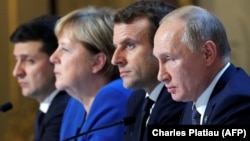Their December 9 Paris summit on ending the conflict in eastern Ukraine ended without significant breakthroughs, but, to all participants, the fact that Ukrainian President Volodymyr Zelenskiy, Russian President Vladimir Putin, French President Emmanuel Macron, and German Chancellor Angela Merkel even met and will meet again appears a success in itself.
After eight hours of talks at France’s presidential residence, the Elysee Palace, the agreement to reconvene the quadrilateral talks in four months’ time is the “biggest result” from this long-awaited summit, Oleg Ignatov, the deputy director of Moscow’s non-governmental Center for Current Policy, commented to Current Time during its live broadcast of the summit. The meeting was the first such since 2016.
The other agreements reached had been predicted earlier.
Ukraine and Russia agreed about a "full and comprehensive implementation" of a ceasefire by the end of 2019. As part of those measures, they also chose agreed to three new sites for a partial withdrawal of Ukrainian and Moscow-backed separatist armed forces in Donbas. The final communique, however, does not specify the locations. (A pullout has already occurred at Stanytsya Luhanska, Zolote, and Petrovske). The withdrawal should take place by the end of March 2020.
Following up on this year's earlier exchange of prisoners, the two sides also pledged to carry out a complete exchange of "conflict-related detainees" before December 31, according to the summit’s official concluding statement. In a late-night press conference, President Zelenskiy stated that December 24 could be the date for the handover, but President Putin has not confirmed that.
Against this backdrop, French President Macron and German Chancellor Merkel conveyed a certain degree of restrained optimism about the future.
At the post-summit press conference, President Macron stated that Putin and Zelenskiy had agreed, over the next four months, to come up with the prerequisites for holding elections in separatist-controlled areas of eastern Ukraine’s Donetsk and Luhansk regions. The elections will occur according to the so-called Steinmeier Formula, he said.
This framework for a lasting peace deal stipulates that Ukraine will regain control over the entire Ukrainian-Russian border after the elections, if the Organization for Security and Cooperation in Europe deems them fair and democratic.
Ukraine has agreed to follow the Steinmeier Formula, but, ahead of the Paris summit, President Zelenskiy made plain that Kyiv wants control over its side of the border before any local elections occur. (Kyiv currently does not control about 400 kilometers of the roughly 2,300-kilometer-long border.)
President Macron acknowledged that ongoing differences exist between Russia and Ukraine on this topic, but Chancellor Merkel, in turn, emphasized the role that “good will” can play in helping the foursome to resolve “very complicated” issues.
She underlined that a law about a “special status” for Donetsk and Luhansk should play an important role in supplying the political conditions for holding elections in these areas.
Similarly, President Putin proposed “introducing changes into Ukraine’s constitution strengthening the special status of Donbas on a permanent basis.” He also touched on the necessity of coordinating any ceasefire agreement with such reforms.
Zelenskiy, however, displayed no inclination to entertain Moscow’s constitutional-reform proposals. He emphasized the “impossibility of anyone exercising influence” on Ukraine’s further political development. “Ukraine is an independent, self-reliant, democratic state and the people, exclusively, will choose its path of development,” he said.
On December 10, he announced the year-long extension of a law for local governance in Donbas, but stated that this does not mean making the Steinmeier Formula part of Ukrainian law – a step he termed “a very complicated, technical thing,” the Ukrainian news agency UNIAN reported.
In Paris, the Ukrainian leader also rejected the idea of federalization, a concept actively promoted by the Kremlin. “Ukraine is a unitary state. Federalization is not possible,” he said.
He identified “regulating the situation in eastern Ukraine via concessions of Ukrainian territory within the confines of internationally recognized borders” as another non-starter. “We all know that, for every Ukrainian, both Donbas and Crimea are Ukraine,” he said.
For his part, President Putin focused on the “thaw” in relations with Ukraine, citing this year’s earlier prisoner exchange, troop withdrawal, and the Paris meeting itself as positive steps.
At the same time, he continued to cite the necessity for “direct dialogue between the parties to the conflict.” Despite its military, economic, and political support for the Donetsk and Luhansk separatists, Moscow does not consider itself among these parties.
Asked by a reporter for the Russian state-run RIA Novosti agency whether he would, in fact, hold such talks, Zelenskiy shifted the focus, stating that he has “an enormous number of friends who are residents of occupied Donbas” with whom he speaks “all the time.”
Interest in talking appears to be the main interest the leaders of Russia and Ukraine have in common. As part of the Paris discussions, they met one-on-one for less than half an hour
A discussion about a gas-transit dispute between Russia and Ukraine – an unprecedented addition to the Donbas negotiations – also took place. As did the main Paris event, however, talks between Ukraine’s Naftogaz, Russia’s GazProm, Ukrainian Energy Minister Oleksiy Orzhel, and Russian Energy Minister Aleksandr Novak led to an agreement to talk again in the future.
For some, however, after more than five years of war in eastern Ukraine, however, such agreements could be enough.
“A meeting is better than no meeting,” Moscow Carnegie Center senior fellow Andrei Kolesnikov commented to Current Time ahead of the summit. “Talks are better than no talks.”
Editor's Note: This article earlier stated that Kyiv controls around 400 kilometers of the Ukrainian-Russian border. This was a copy-editing error. In reality, Kyiv does not control around 400 kilometers of the border.





Facebook Forum